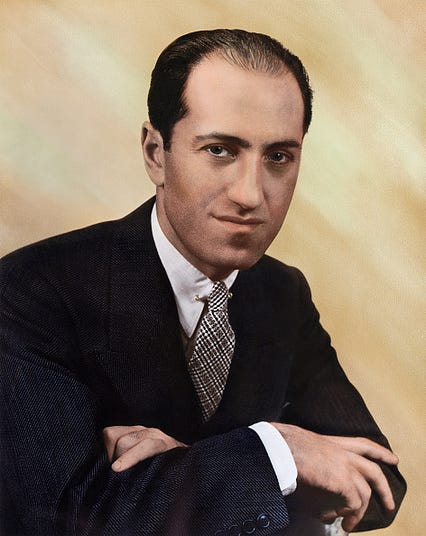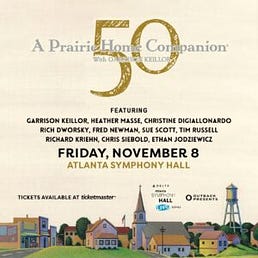|
 |
The Writer's Almanac from Thursday, September 26, 2013
"Sailing on Lake Superior" by Kirsten Dierking, from Northern Oracle. © Spout Press, 2007.
ORIGINAL TEXT AND AUDIO - 2013
It's the birthday of composer George Gershwin, born Jacob Gershowitz, in Brooklyn, New York (1898). He was born to Russian immigrants and spent his childhood in Brooklyn and the Lower East Side. As a young boy, he was more athletic and sociable than he was musical. But he went to work on Tin Pan Alley for the Jerome Remick Company handing out the publishers' newest sheet music to any potential customers who wandered by. He eventually began composing his own songs. At 19, he and a childhood friend, Irving Caesar, wrote a song together called "Swanee." Al Jolson made the song a huge hit, and Gershwin was on his way.
Gershwin wrote Concerto in F (1925), An American in Paris (1928), and the famous folk opera Porgy and Bess (1935). It was based on the book Porgy (1925), by DuBose Heyward. It's the story of black life in a ghetto of Charleston, South Carolina. Gershwin's music was influenced by black spirituals, Jewish chants, ragtime, and classical opera, and his songs include "Summertime," "Bess, You Is My Woman Now," and "I Got Plenty O' Nuttin'."
Gershwin had a close friend named Oscar Levant, also a pianist. Levant complained to the composer that when they traveled together on trains he always had to take the upper berth while Gershwin had the lower. Gershwin replied: "That's the difference between talent and genius."
When Gershwin was in his mid-30s, what started as simple headaches became more serious and chronic. He started to forget portions of his compositions while performing. Doctors found a brain tumor and suggested emergency surgery. Specialists were to be flown in to California to perform the potentially lifesaving operation, but Gershwin did not survive the surgery and died on July 11, 1937 in Hollywood.
He said: "True music must repeat the thought and inspirations of the people and the time. My people are Americans and my time is today."
It's the birthday of poet T(homas) S(tearns) Eliot, born into a prominent Unitarian family in St. Louis (1888). His most famous poem is The Waste Land (1922), a dark and complex poem about the search for redemption in a post-World War I world. From a young age, Eliot wrote about moral decay and aging and the hopelessness of life. When he was 16, he wrote, "For time is time, and runs away."
In The Love Song of J. Alfred Prufrock (1915), he wrote,
I grow old ... I grow old ...
I shall wear the bottoms of my trousers rolled.
Shall I part my hair behind? Do I dare to eat a peach?
I shall wear white flannel trousers, and walk upon the beach.
I have heard the mermaids singing, each to each
I do not think that they will sing to me.
In his 1948 acceptance speech for the Nobel Prize in literature, T.S. Eliot said: "Partly through his influence on other poets, partly through translation ... partly through readers of his language who are not themselves poets, the poet can contribute toward understanding between peoples ... I stand before you, not on my own merits, but as a symbol, for a time, of the significance of poetry."
And he said: "The one thing you can do is to do nothing. Wait ... You will find that you survive humiliation and that's an experience of incalculable value."
It was on this day in 1957 that the musical West Side Story opened on Broadway. Ten years earlier, choreographer Jerome Robbins had envisioned a modern retelling of William Shakespeare's Romeo and Juliet, set in the streets of New York. The Romeo character would be an Irish Roman Catholic, and Juliet would be a Jewish Holocaust survivor; the Catholic gang would be the Jets, and the Jewish gang the Emeralds. Robbins recruited Arthur Laurents to write the story and Leonard Bernstein to write the music. Laurents wrote a draft of East Side Story, set during the Easter-Passover season, but all three men decided that the basic premise was too similar to other popular stories, so they set it aside.
Years later, in 1955, Laurents and Bernstein were both working in Hollywood, relaxing by a swimming pool at the Beverly Hills Hotel. The talk turned to current events, including gang violence in Los Angeles between whites and Hispanics. They realized that this tension could be the perfect fit for the musical they had abandoned. The love interests became a Polish-American named Tony and a Puerto Rican named Maria, the Emeralds became the Sharks, and East Side Story became West Side Story.
Robbins, Laurents, and Bernstein ran into problem after problem. Every producer they knew in Manhattan turned them down, convinced that the show was too risky — too depressing, too controversial, and too much opera. They finally signed on a team of producers, only to have them back out just before rehearsals were set to begin. After several potential lyricists fell through, the trio brought in the relatively unknown Stephen Sondheim, who was in his mid-20s. Sondheim managed to convince one of his friends, Hal Prince, to take on the role of producer; but after Prince took over, Robbins announced he wasn't going to choreograph the show after all — he wanted to direct it. They convinced Robbins to stay on as choreographer by giving him the director's role as well, and by letting him have an eight-week dance rehearsal instead of the normal four weeks.
Then they had a tough time trying to find actors. Unlike most musicals, which typically had separate choruses, West Side Story demanded leads who were excellent at singing, acting, and dancing—plus they had to look like teenagers. One of the actors who auditioned but wasn't accepted was Warren Beatty; the casting notes about him said: "Good voice — can’t open his jaw— charming as hell — clean cut." The actors who finally made the cut were young and talented, but mostly unknown. Robbins pushed his cast to try and make the conflict seem more real. He kept the Jets and the Sharks segregated offstage, and he posted articles about gang violence on the wall with messages like "This is your life!" written across the top. Columbia Records refused to record the cast album — they thought it was too dark and edgy. When they finally relented and recorded it, it was a huge seller.
With such well-known people collaborating to make West Side Story, there were tensions over who would receive certain billing. In the pre-Broadway run, Bernstein and Sondheim were listed as co-lyricists, and none of the reviews mentioned Sondheim since Bernstein was much more famous. Bernstein generously removed his name, which Sondheim wasn't sure he liked because he didn't like all of Bernstein's lyrics. Robbins insisted on a prominent credit that the show was "conceived by" him, and the other three were so mad that they were barely speaking to Robbins on opening night.
During the weeks leading up to the opening of West Side Story, the news was full of stories of gang violence and racial confrontations. At the end of August, Strom Thurmond filibustered for more than 24 hours to try and prevent the passage of the Voting Rights Act. The day before the show's opening, federal troops forcibly integrated Little Rock High School.
In general, critics responded favorably to West Side Story, but all the major Tony Awards went instead to The Music Man, a bubbly, nostalgic musical about a small town in Iowa.
Be well, do good work, and keep in touch.®
We hope you can join us in Atlanta on November 8! CLICK HEREfor details!
If you are a paid subscriber to The Writer's Almanac with Garrison Keillor, thank you! Your financial support is used to maintain these newsletters, websites, and archive. If you’re not yet a paid subscriber and would like to become one, support can be made through our garrisonkeillor.com store, by check to Prairie Home Productions, P.O. Box 2090, Minneapolis, MN 55402, or by clicking the SUBSCRIBE button. This financial support is not tax deductible.


